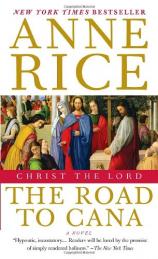Reading Group Guide
Discussion Questions
Christ the Lord: The Road to Cana

1. In the Christian New Testament, the Gospel of John records that Jesus' first miracle happened at the wedding feast of Cana, where water was changed into wine. Also in the Christian New Testament, the Gospel of Matthew states that, before performing any miracles, Jesus first entered the desert, where he was tempted by the Devil. Rice's first title for this book was The Temptation. Why do you think she changed the title to The Road to Cana?
2. Rice has customarily written in the first person, which offers the reader a particular insight into the inner life of the protagonist. In The Road to Cana, does the first-person narration give us insight into the inner life of Jesus? Is the intent of God elucidated? Discuss how revelations of Jesus' personal life are meaningful for contemporary Christians.
3. In The Road to Cana, Jesus says, "What I must know, I know. And what I must learn, I learn."Thomas Aquinas explicated Jesus' human intellect as having a threefold font of knowledge: divine knowledge, infused knowledge, and experiential knowledge. With regard to Jesus' experiential knowledge specifically, how does Avigail contribute to Jesus' experience and knowledge of love? Does he learn about human love? Discuss whether experience and knowledge can help one to love more humanely.
4. Discuss the divine power that Jesus demonstrates as God’s son in The Road to Cana. In chapter 22, how does Jesus overpower Satan?
5. The New York Times Book Review of Christ the Lord: Out of Egypt states: "Ms. Rice retains her obsessions with ritual and purification. . . . She writes this book in a simpler, leaner style, giving it the slow but inexorable rhythm of an incantation." Are the Christ the Lord books a prayer for Rice? Discuss instances in The Road to Cana where Rice has written rituals of purification and incantation.
6. Which of the four Christian gospels most influenced The Road to Cana? Which gospel stories are distinctly portrayed? Discuss whether these gospel stories inspire rites of maturity for all Christian faiths today.
7. First-century Jewish women worshiped in the Ezrat Nashim --- the Women's Courtyard --- which was located beside or behind the men's place of worship. How does Rice's scholarship and penchant for historical authenticity enable her to accurately depict the role of Jewish women in first-century Palestine? In The Road to Cana, does Jesus criticize, whether by word or by deed, this masculine/feminine segregation? Discuss how new understandings of masculinity and femininity have influenced today's religious practices.
8. The Gospel of John is the only biblical source that mentions the wedding feast at Cana. In John’s account, Jesus' mother, Mary, informs him at the wedding feast that the wine has run out. It is Jesus' reply to her that has mystified many throughout the centuries. In the final chapter of The Road to Cana, Rice quotes this reply: "Woman? . . . What has this to do with you and me?" Catholic saints, Christian biblical scholars, and homilists have attempted to explain this seemingly callous rejoinder, but their explications vary. How does The Road to Cana treat the mystery behind this dialogue between mother and son? Discuss whether Rice lends a mother's tenderness to the scene.
9. Mel Gibson's film The Passion of the Christ (2004) focuses on the suffering and death of Jesus. In what ways does Rice's Jesus differ from Gibson’s? Specifically, when does Jesus, as depicted in The Road to Cana, show real human passion?
10. In an essay posted on her Web site, Rice says of her own writing career: "[My earlier novels] are not immoral works. They are not Satanic works. They are not demonic works. . . . The one thing which unites [my works] is the theme of the moral and spiritual quest. A second theme, key to most of them, is the quest of the outcast for a context of meaning." Is The Road to Cana Rice's attempt to show Jesus' spiritual quest?
11. Jesus, the narrator of The Road to Cana, begins by positing a solitary question: Who is Christ the Lord? Discuss whether this question has been answered by the end of the novel. If not, will this question ever be answered?
Christ the Lord: The Road to Cana
- Publication Date: February 24, 2009
- Mass Market Paperback: 336 pages
- Publisher: Anchor
- ISBN-10: 1400078946
- ISBN-13: 9781400078943








